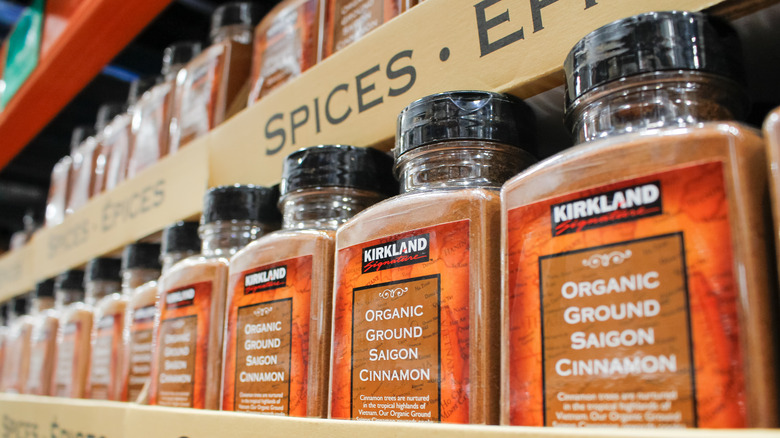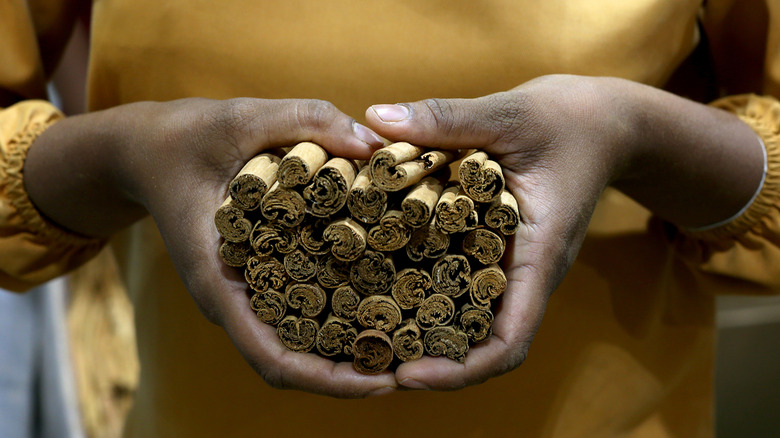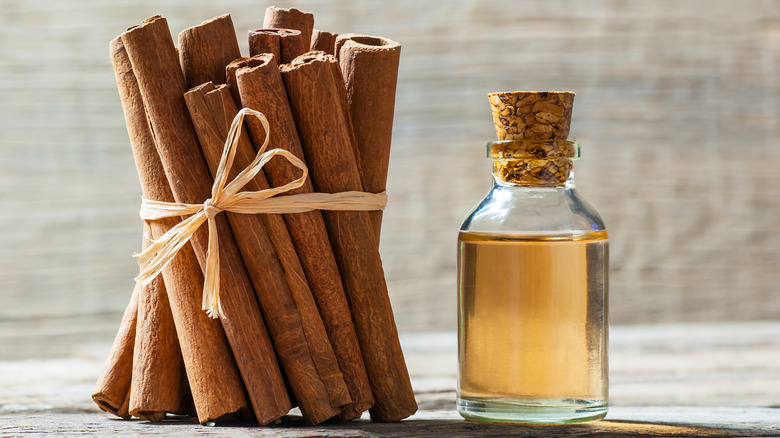What You Should Know Before Using Saigon Cinnamon
Internet challenges aside, cinnamon is a particularly popular spice, especially for baking sweets. While trying to swallow a spoonful of cinnamon in the name of social media clout is potentially hazardous (via the Rady Children's Hospital), incorporating it in small quantities can add loads of flavor and even some surprising health benefits to your diet.
Cinnamon is a spice harvested from the inner bark of certain tree species that grow in south and southeast Asia, Mexico, and East Africa (via Allrecipes). You can buy cinnamon in sticks that can be used to garnish a spiced cider (via Food Network) and in the powder form you might already have in your pantry. Cinnamon is a versatile ingredient that adds an earthy, spicy sweetness to any dish. However, you may not realize that there is more than one type of cinnamon, depending on the type of tree it comes from and where it grew.
Essentially, there are two main categories of cinnamon: Ceylon cinnamon, which is also called "true cinnamon," and cassia cinnamon. Each has its own flavor profile. Saigon cinnamon falls into the cassia category.
What are the different types of cinnamon?
You might be inclined to pick up whichever variety of cinnamon you see first at the store. Before doing that, you should learn a little bit more about Saigon cinnamon and how it might be the better choice for you.
Ceylon cinnamon is noted for having a subtler taste, which makes it a particularly coveted variety for baking sweets, like chocolate or churros, or in milder savory dishes (via Spiceography). Saigon cinnamon has a more intense, peppery flavor that gives it more of an edge when using it for cooking, so it works well in bold Chinese spice mixes, for example. Saigon cinnamon's strong flavor comes from the higher concentration of cinnamaldehyde in its essential oils compared to Ceylon cinnamon.
Saigon cinnamon is also said to improve overall palatability. If you're a picky eater, sprinkling a bit of Saigon cinnamon on your next snack might help you out! To decide which type of cinnamon might work best in your recipe, Allrecipes suggests making some quick tea by pouring hot water over a teaspoonful of each and giving them a taste.
Saigon cinnamon has some health benefits
In addition to its outstanding flavor, Saigon cinnamon is beneficial in some surprising ways. The high concentration of cinnamaldehyde that gives Saigon cinnamon its strong flavor also gives it antioxidant and anti-inflammatory properties, according to Healthline.
If you make a point of incorporating Saigon cinnamon into your diet, its anti-diabetic properties may help reduce your blood sugar levels. Though data is still being collected on Saigon cinnamon specifically, this variety may also have antibacterial and antimicrobial properties.
Don't let these potential health benefits cause you to go too heavy on the Saigon cinnamon, however. Healthline notes that Saigon cinnamon has a higher concentration of natural coumarin, which can be toxic. A separate Healthline article warns that too much coumarin may cause liver damage and could potentially increase the risk of certain cancers. Experts advise eating no more than one teaspoon of Saigon cinnamon a day — yet another reason the cinnamon challenge is a bad idea!


